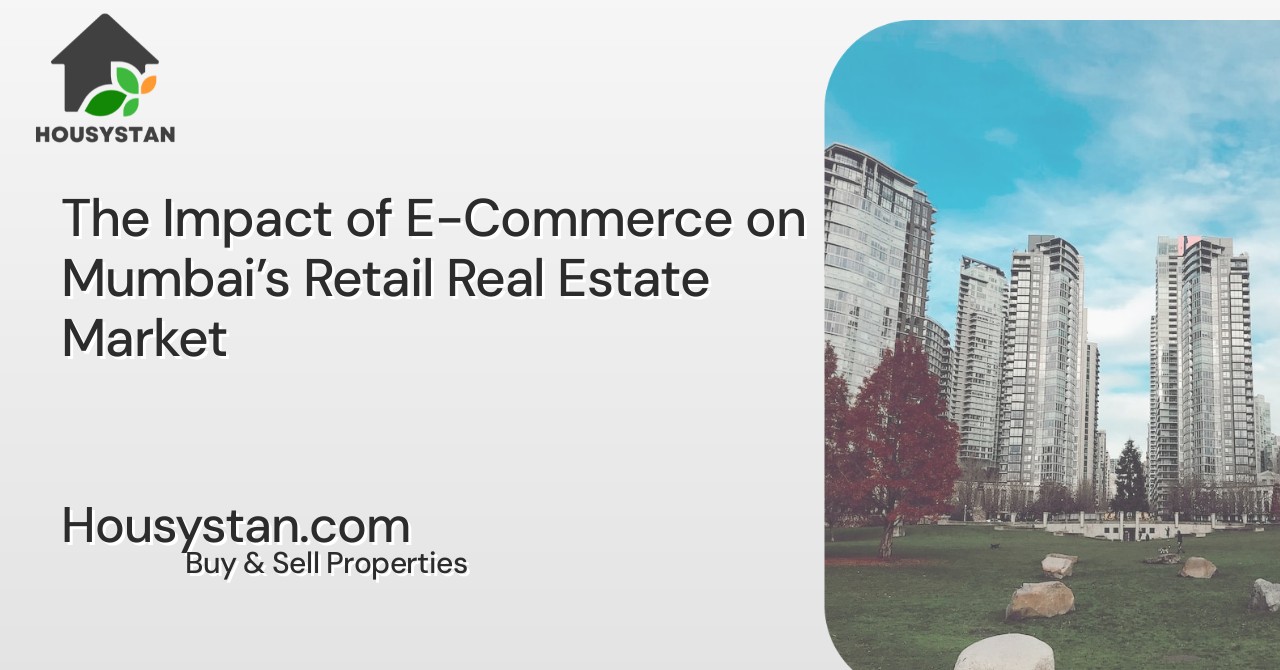The Impact of E-Commerce on Mumbai’s Retail Real Estate Market
Read latest blogs and articles from Housystan

The Information mentioned here was last updated on:
21/2/2026The Impact of E-Commerce on Mumbai’s Retail Real Estate Market
Introduction: Mumbai’s Retail Landscape in Transformation
Over the past decade, Mumbai’s retail real estate market has experienced a profound transformation, largely driven by the meteoric rise of e-commerce. This digital revolution has redefined shopping patterns, altered consumer expectations, and forced retailers and developers alike to rethink their strategies. In a city synonymous with commercial dynamism, the interplay between e-commerce and physical retail spaces in Mumbai is shaping a new urban narrative—one marked by opportunity, adaptation, and challenge.
- Verified Tenants/Buyers
- Unlimited Property Listing
- Zero subscription/charges fee
E-Commerce Revolution: Redefining Shopping in Mumbai
The e-commerce boom has had a ripple effect on Mumbai’s retail sector. With leading platforms such as Amazon, Flipkart, and niche local players offering an extensive range of products, convenience has become the new currency for consumers. The ease of online transactions, combined with swift last-mile delivery, has led to an exponential rise in online shopping. According to industry reports, Mumbai’s e-commerce penetration has surged, particularly in the aftermath of the pandemic, cementing the shift toward digital retail channels.
Changing Consumer Preferences: From Malls to Mobile Screens
One of the most notable impacts of e-commerce on Mumbai’s retail real estate is the change in consumer behavior. Shoppers are no longer restricted by geography or store hours. Instead, they can explore global brands and local labels alike from the comfort of their homes. This shift has led to a decrease in footfalls at traditional brick-and-mortar stores, prompting retailers to reconsider the utility and size of physical outlets. While flagship stores and experiential retail spaces continue to hold value, many brands are downsizing or relocating to prime locations with higher visibility and foot traffic.
Vacancy Rates and Rental Trends: A New Normal
The proliferation of e-commerce has resulted in a steady increase in vacancy rates across Mumbai’s retail real estate sector, especially in peripheral malls and high-street locations. Rental values, once buoyed by intense competition for prime spots, have begun stabilizing or even declining in less sought-after areas. However, the story is different in premium shopping districts such as Colaba, Bandra, and Lower Parel, where experiential and luxury brands continue to attract shoppers seeking an immersive retail experience.
Rise of Omnichannel Retailing: Bridging Online and Offline Worlds
Recognizing the irreversible growth of e-commerce, Mumbai’s retailers are embracing omnichannel strategies. This approach seamlessly integrates online and offline experiences, allowing customers to browse, purchase, and return products across multiple platforms. Click-and-collect services, digital kiosks, and augmented reality fitting rooms are becoming common features in leading malls. As a result, retail spaces are being reimagined—not just as points of sale, but as hubs for delivery, pickup, and brand engagement.
Warehousing and Logistics: A New Growth Avenue
The surging demand for online shopping has also catalyzed the growth of warehousing and logistics infrastructure in Mumbai’s suburbs and outskirts. Developers are now repurposing or constructing new properties tailored to the needs of e-commerce giants. Proximity to transport networks, scalability, and advanced inventory management systems are driving investments in logistics parks and distribution centers. This trend is altering the real estate landscape, with industrial and warehousing segments emerging as key growth engines.
Adapting to the Experience Economy: The Future of Mumbai Malls
As e-commerce continues to disrupt traditional retail, Mumbai’s malls are repositioning themselves as lifestyle and entertainment destinations. The focus is shifting toward offering unique experiences—such as food courts, entertainment zones, fitness centers, and pop-up events—that cannot be replicated online. Developers are investing in refurbishments, introducing flexible leasing models, and collaborating with experiential brands to enhance overall footfall and tenant mix.
Challenges and Opportunities for Developers and Investors
For developers and investors in Mumbai’s retail real estate, the e-commerce wave presents both challenges and opportunities. On one hand, declining demand for conventional retail spaces has necessitated a re-evaluation of leasing strategies and asset portfolios. On the other, the rise of omnichannel retailing, warehousing, and mixed-use developments opens up fresh avenues for growth. Adopting technology-driven solutions, fostering partnerships with e-commerce players, and focusing on sustainability will be critical to long-term success.
Policy and Infrastructure: Enabling the New Retail Paradigm
The government’s push for digitalization, improvements in urban infrastructure, and regulatory reforms have played a pivotal role in supporting the evolution of Mumbai’s retail real estate market. Initiatives such as the Unified Payments Interface (UPI), Smart City projects, and streamlined approvals for warehousing developments are fostering a more conducive environment for both traditional and new-age retailers. Continued investment in transport, broadband connectivity, and public amenities will further accelerate the integration of e-commerce with physical retail spaces.
Conclusion: The Road Ahead for Mumbai’s Retail Real Estate
The impact of e-commerce on Mumbai’s retail real estate market is undeniable and far-reaching. As consumer preferences evolve and technology continues to advance, the city’s retail landscape will remain in a state of flux. Success in this new era will hinge on adaptability, innovation, and a keen understanding of the interplay between digital and physical retail. For Mumbai, the future lies in creating vibrant, multi-dimensional spaces that cater to the aspirations of a connected, experience-driven urban populace.